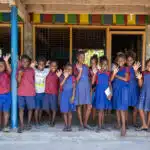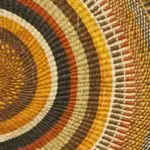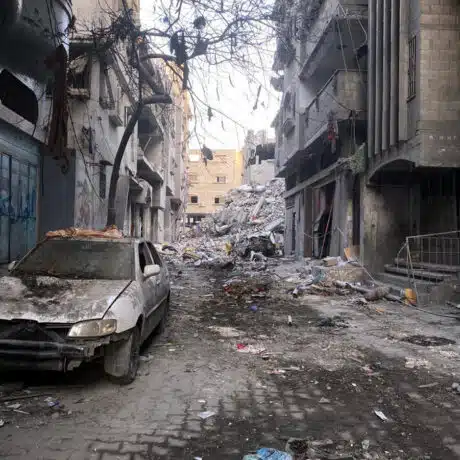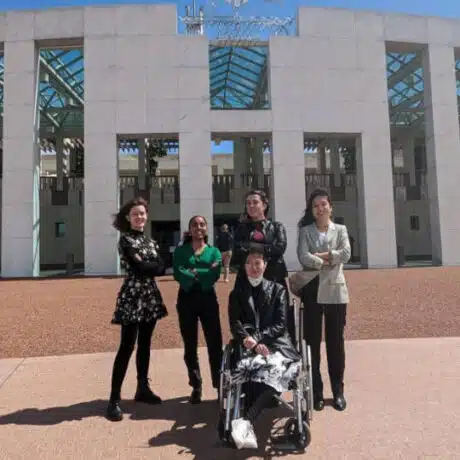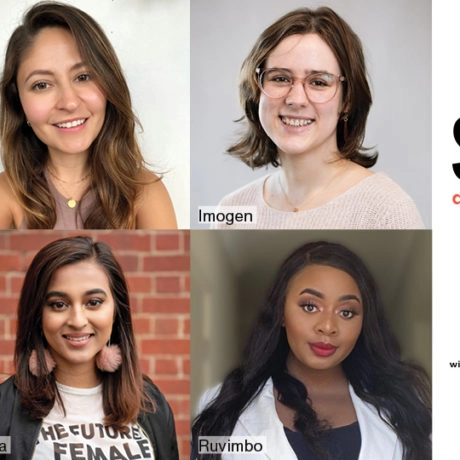News and Stories - Advocacy - 13 June 2019
Solomon Islands Education Campaign Launch

In the Solomon Islands, ninety-three per cent of girls do not graduate high school. That’s ninety-three percent of girls who are being held back from achieving their potential.
Last week we launched our first ever youth-led reports – Stronger Together and Our Education, Our Future – providing an insight into the barriers preventing girls from accessing and completing their secondary education, and the changes they’d like to see.
Today, over 3000km away in Honiara, three of our Solomon Island’s Youth Champions helped to officially launch the incredible reports they co-researched, wrote and photographed with 60 other adolescent girls.
The launch event was attended by over 50 guests, including officials from Government Ministries, representatives from the Youth Parliament, Australian and NZ High Commissions, UN Women, the National Education Board, civil society organisations, disability organisations and INGOs.
Our Plan International Solomon Islands Youth Champions, Elizabeth (21), Elima (21) and Aroma (17) addressed attendees with the below speech, and they are calling on their government to break the barriers to girls’ education by ending school fees.
We are Elizabeth, Elima and Aroma.
We are the Youth Champions of Plan International Solomon Islands.
We are five members, two are not here due to exams. We represent 60 other girls who took part in this Photovoice project.
We wanted to be Youth Champions because we are willing to take the chance we have to voice out what we young girls in Solomon Islands are facing and are not recognised.
We are going to talk to you a bit about how we came up with the Photovoice – the research process; why we came up with these photographs – how we identified the issues and barriers; and what change we want to see happen – the recommendations and solutions we have come up with.
The Photovoice process was really interesting, fun, empowering, exciting and challenged us to think critically and creatively.
First we designed the research question and identified the barriers stopping all girls and young women from accessing and completing secondary school.
We also interviewed our peers to test our answers with them, including with girls who are in school and who have been pushed out of school.
Then we had one week to take photos which represent those barriers. We did this individually and in small groups.
We chose a few of those photos, the ones that are clear, and came up with captions that explain why we took those images, what they represent, and the change we want to see.
We feel happy and empowered because these are issues that young girls are facing and most people overlook it, but now our voice will be heard and we are pleased to see you all here today because it is the first step in hearing and listening to what we have to say.
The problems or barriers that stop girls from completing high school include issues such as school fees, peer pressure, teenage pregnancy and unsafe roads to school.
From my experience, I have a sister who didn’t complete high school due to peer pressure and relationship. And I know it isn’t just my sister this happens to, it is many girls in Solomon Islands. If she had good teaching in homes and school, awareness about drugs and how to say no to peer pressure, then she would have been able to stay in school.
A friend of mine, very kind, talented and smart, had to leave school due to school fee problems. Her parents can’t afford complete buying her school fees. It is a heart-breaking moment for me, seeing my best friend leaving for her village, and I can’t do anything about it. But if her parents are well-educated, have a job with a fixed income, that could support her fully – or a fee free for secondary education then we would have completed high school together.
In the reports, each barrier has a section called “what’s the solution?” These are the changes we want to see and the recommendations for change. Things like secondary school fees to be eliminated and extra fees reduced; sexuality education in schools and communities; schools supporting students with free safe transport; and girls getting equal treatment when it comes to education
You are the people who can help us make this change. We believe we are all Stronger Together – that together we can work to help get more and more young girls into and completing secondary education. We respectfully ask you to consider what you will do in your role to advance girls’ education and gender equality.
We believe this is important because we know how powerful girls’ education is for our futures – Our Education, Our Future.
Together with the 60 girls we worked with on this Photovoice project, we put together a Girls’ Statement, a vision of the future we want to see in the Solomon Islands. We need more girls to complete secondary education to get to this future.
GIRLS’ STATEMENT
We, young girls and women of the Solomon Islands, need to have the chance to go through and complete our secondary education.
We want all young girls and women to be able to achieve and to succeed, so that we can move forward to a better and brighter future.
A future where we are equal.
A future where we are confident and bold.
A future where we can speak up and out.
A future where we, young girls and women of the Solomon Islands, are leaders:
- in our families
- in our communities
- in our churches
- in our schools
- in our nation
We respectfully ask you to listen to what we think, and listen to how we feel.
Hear our voice. Stand with us. Together we can make a change!
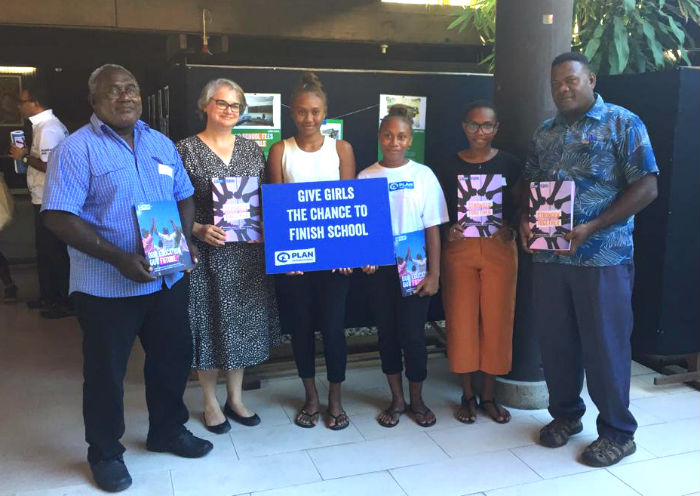
The Under Secretary of the Ministry of Education, Mathias Kutai, officially launched the report, followed by guest speakers Aaron Pitaque, Under Secretary of the Ministry of Women, Youth, Children and Family Affairs; Sally-Anne Vincent, Australian Deputy High Commissioner; Ella Kauhue, Country Program Manager from Plan International in Solomon Islands; and three of the Plan International in Solomon Islands Youth Champions.
- – Mathias Kutai, Under Secretary of the Ministry of Education
- – Ella Kauhu, Country Program Manager of Plan International in Solomon Islands

